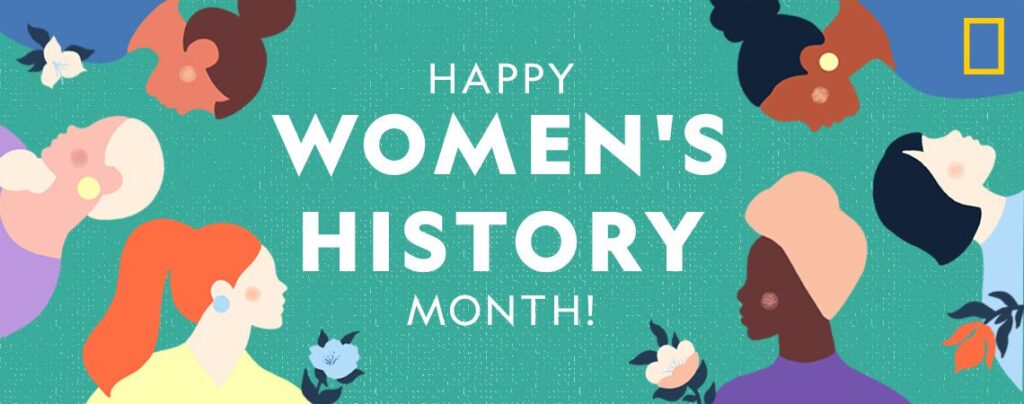
Every March, Women’s History Month provides an opportunity to honor the generations of trailblazing women and girls who have built our Nation, shaped our progress, and strengthened our character as a people.
Throughout our history, despite hardship, exclusion, and discrimination, women have strived and sacrificed for equity and equality in communities across the country. Generations of Native American women were stewards of the land and continue to lead the fight for climate justice. Black women fought to end slavery, advocate for civil rights, and pass the Voting Rights Act. Suffragists helped pass the 19th Amendment to the Constitution so that no American could be denied a vote on the basis of sex.
Source: White House Proclamation on Women’s History Month 2022
To learn more about Women’s History Month and the many “sheroes” who came before us, check out these resources:
- Women’s History Month
- History.com.
- Read about two of this year’s themes: for Women’s History Month, “Women Providing Healing, Promoting Hope” established by the National Women’s History Alliance, and for International Women’s Day, Break the Bias .
- Meet the Women Making History at National Geographic.
- What to Watch: Women’s History Month on PBS.
Remembering an OG-Break-the-Bias Pioneer in Addiction Recovery
By Chrissie Martin, Regional Clinical Director

From an early age, Dr. Mary Jeanne Kreek knew she wanted to be a doctor and a scientist. She was breaking glass ceilings in a male-dominated field without even realizing it and was one of the founders and original research team members for methadone treatment and addiction research, along with Drs. Marie Nyswander and Vincent Dole. One year ago March 27 was when the world lost this remarkable pioneer and I can’t think of a better person who personifies the hashtag #breakthebias in honor of Women’s History Month.
Much of her research formed the foundation for the work we do at BHG. Rockefeller University, where methadone research originated, produced this inspiring video interview of Dr. Kreek that beautifully highlights her contributions to both addiction research and to women.
Dr. Richard Lifton, president of The Rockefeller University, said after her passing, “Mary Jeanne was the Patrick E. and Beatrice M. Haggerty Professor and Head of the Laboratory of the Biology of Addictive Diseases, as well as Senior Physician at the Rockefeller University Hospital. Mary Jeanne was a pioneer in the biology of addiction research and made seminal contributions that led to methadone’s successful use as a treatment for heroin addiction. Beyond her scientific endeavors, she was a champion for her patients, often speaking out against the societal stigma they faced.”
Breaking glass ceilings, barriers to care
I first learned about Dr. Kreek early in my career in opioid treatment and her leadership and courage has been inspirational in my own learning. Her legacy is one of determination, perseverance, and respect for preserving the dignity of people with opioid use disorder, including extensive research on the role of genetics in the formation of addiction.
As a young child, Dr. Kreek’s female pediatrician left an indelible mark on the lens through which she saw her life. At every appointment, her doctor would say “When you grow up, you’re going to be a doctor.” So, by the age of 5, Dr. Kreek was saying “Ok, I’m going to be a doctor” and began blazing a trail that not only exposed her to politics, policies, and international relations in her teenage years, but also fortified her innate strength from living through paralytic polio. Unable to move the right side of her body for six months, she enrolled in a rigorous classical ballet school to restore her muscles. Later in her career, that difficult time helped her relate to the individuals with heroin addiction whom her team brought in for research from Sing Sing Prison. Many of them would say they continued taking heroin not to get high, but to feel normal. She deeply understood what it felt like to want to be normal.
Before she passed away, she was painfully aware of stigma’s weight on our society and, despite scientific findings, MAT for opioid addiction and medical education about addiction was, and still is, controversial.
I’d like to think that I, and my BHG teammates, are carrying on Dr. Kreek’s legacy by our daily actions in how we show up for our patients and communities, and that one day, we will slam the stigma door shut and eliminate the inequities in our industry and access to care.
Thank you, Dr. Kreek, for leaving your indelible mark on generations of women doctors, scientists, nurses, and counselors to come.
